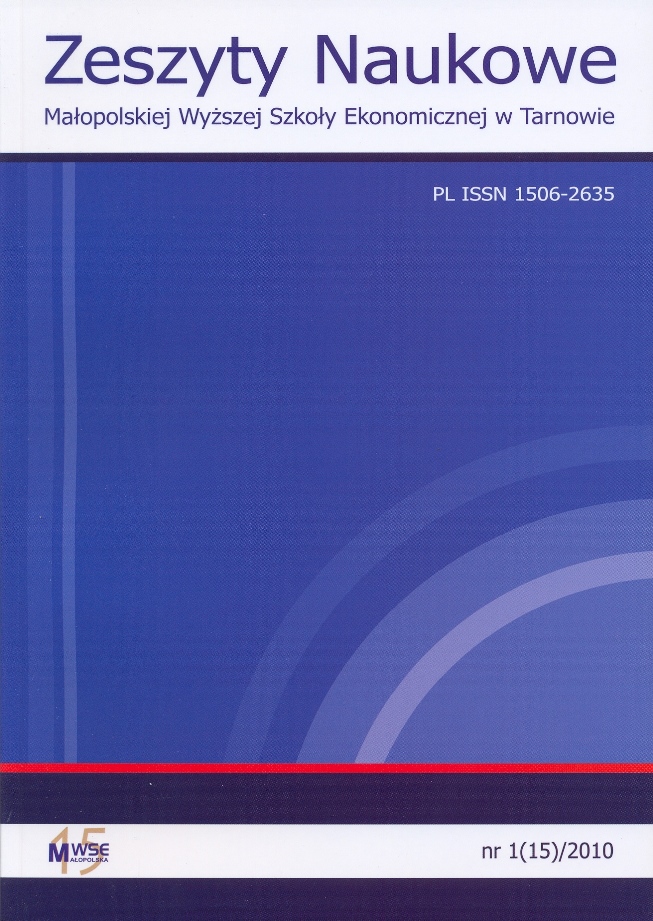Abstrakt
Głównym celem opracowania była odpowiedź na pytanie, jaki jest wpływ regularnych ćwiczeń aerobowych na poziom rozwoju zdolności motorycznych 20-letnich kobiet. Badaniami objęto 12 dziewcząt, studentek Uniwersytetu Jagiellońskiego, uczęszczających regularnie (2 razy w tygodniu) na zajęcia aerobowe zamiast regularnych zajęć wychowania fizycznego. Zajęcia były obowiązkowe i trwały 4 miesiące. Przed podjęciem przez kobiety zajęć aerobowych oraz po ich zakończeniu wykonano testy pośrednie określające poziom poszczególnych zdolności motorycznych, tj. szybkości, siły, wytrzymałości i koordynacji. Uzyskane wyniki poddano podstawowej analizie statystycznej. Na ich podstawie stwierdzono, że zajęcia aerobowe nie wpłynęły na średnią masę ciała badanych dziewcząt. Stąd wniosek, że regularne zajęcia aerobowe mają raczej wpływ na utrzymanie stałej masy ciała niż jej redukcję, co jest zgodne z danymi z literatury. Nie stwierdzono jednoznacznych zmian w poprawie wytrzymałości (różnokierunkowe zmiany VO2max). Wyniki te wskazują na różną odpowiedź poszczególnych uczestniczek zajęć aerobowych, zależną z pewnością od wyjściowego poziomu wytrenowania. Stąd konieczna wydaje się wstępna selekcja niejednorodnych pod względem sprawności grup, która umożliwi odpowiedni dobór ćwiczeń w stosunku do wyjściowej wydolności organizmu. U wszystkich badanych kobiet zanotowano poprawę wyników w próbach badających takie zdolności motoryczne, jak siła czy szybkość. Wskazuje to na przewagę komponentu siłowo-szybkościowego w prowadzonych zajęciach aerobowych.
Bibliografia
Ambroży D., Pilch W. 2007. Wpływ 7-miesięcznych ćwiczeń fizycznych wykonywanych podczas aerobiku na poprawę wydolności fizycznej, zmianę masy i składu ciała młodych kobiet. „Medicina Sportiva Practica” vol. 8, nr 1, s. 1–4.
Zobacz w Google Scholar
Borysiuk Z. 2004. Profil wysiłkowy grupy kobiet uprawiających aerobik. „Annales Universitatis Mariae Curie-Skłodowska Lublin – Polonia” vol. 59, suppl. 14, s. 42.
Zobacz w Google Scholar
Haleczko A., Włodarczyk U. 2004. Oddziaływanie czynnika somatycznego na wysiłki fizyczne o złożonej, wielokierunkowej strukturze. „Antropomotoryka” nr 14, s. 63–73.
Zobacz w Google Scholar
Jagusz A. i in. 2005. Zdrowotne aspekty obciążeń układu ruchu w aerobiku w badaniach biomechanicznych. „Annales Universitatis Mariae Curie-Skłodowska Lublin – Polonia” vol. 60, suppl. 16, s. 155.
Zobacz w Google Scholar
Klocek T., Klocek E., Spieszny M. 2005. Poziom koordynacji ruchowej i wydolności fizycznej w aspekcie umiejętności ruchowych kobiet uczestniczących w rekreacyjnych zajęciach aerobiku. „Annales Universitatis Mariae Curie-Skłodowska Lublin – Polonia” vol. 60, suppl. 16, s. 208.
Zobacz w Google Scholar
Markis M., Górecka B. 1999. Sprawność fizyczna kobiet uprawiających aerobik. „Nowa Medycyna” nr 6(7), s. 51–53.
Zobacz w Google Scholar
Osiński W. 2002. Antropomotoryka. Poznań: AWF. ISBN 83-88923-22-6.
Zobacz w Google Scholar
Prukner V., Mekota K. 2004. Związek między wydolnością, sprawnością motoryczną i cechami somatycznymi u studentów Uniwersytetu Palacky’ego w Ołomuńcu (Czechy), studiujących wychowanie fizyczne na wydziale kultury fizycznej. „Antropomotoryka” vol. 12, nr 28, s. 21–29.
Zobacz w Google Scholar
Szopa J., Mleczko E., Żak S.1996. Podstawy antropomotoryki. Warszawa – Kraków: Wydawnictwo Naukowe PWN. ISBN 83-01-11946-2.
Zobacz w Google Scholar
© Copyright by Małopolska Wyższa Szkoła Ekonomiczna w Tarnowie. Artykuły są udostępniane na podstawie Creative Commons Attribution Uznanie autorstwa - Użycie niekomercyjne - Bez utworów zależnych 4.0 Licencja Międzynarodowa


